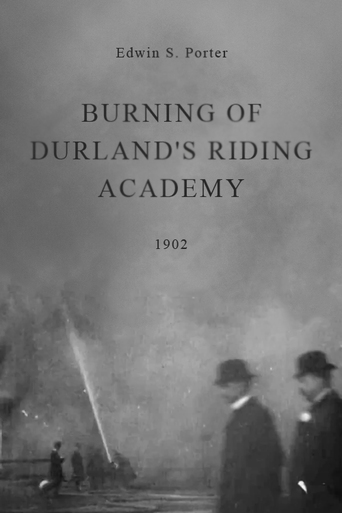

Many of you who have read another of my reviews for Edison's film shorts (most of them filmed when old Tom was virtually the only game in town, as far as movies were concerned, and when he harbored a dream to monopolize American entertainment to the same or a greater extent than he did evening lighting in the U.S.) may be convinced that T.E. was the devil incarnate, or something close to it. While it is true his short ELECTROCUTING AN ELEPHANT of 1903 is no doubt the low point in the history of American entertainment (eclipsing HOWARD THE DUCK and the O.J. Simpson murders), I for one will not go out on a limb to blame him for EVERY dark day in U.S. or Manhattan history, such as the Lincoln assassination, 9-11, or the burning of this riding academy. After all, I was not there personally during the filming of any of the six events mentioned above. The film evidence here (perhaps the earliest movie I've seen which drags on for more than three minutes) suggests that another firebug besides Edison's henchmen instigated this Durland incident, as every fire-fighting scene included here seems to be from the SECOND or THIRD day of the fire, after the building complex already has been reduced largely to mere heaps of smoldering bricks.
... View MoreIn itself, this is relatively good footage of a fire at a riding academy on Manhattan Island, and it also provides a revealing look at film-making in its era. With a running time of almost three and a half minutes, it's relatively long for a feature of its time and genre, and thus it allows you to see how the techniques for this kind of footage were developing. Most of all, this footage and its history demonstrate the competitive and opportunistic nature of the movie business at the time.The most noticeable thing about the footage itself is the frequent use of panning as the camera surveys the aftermath of the fire. The panning is not always smooth, but they do seem to know how to use it to relatively good effect. The footage also contains a good variety of the kinds of sights that you would expect to see, given the situation.This is the kind of movie that could not have been planned for, and it meant that the film-makers had to be ready to go upon receiving word of a fire or other such event. More than that, as film historian Charles Musser indicates in his notes to Kino's DVD collection of Edison movies, this is an example of footage that was later re-packaged and sold as footage from a different event entirely. As such, it is an early (and not entirely honest) example of stock footage, of a kind. So it is an interesting example of the practices of its era.
... View More